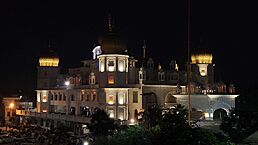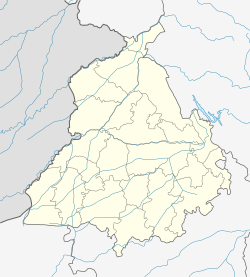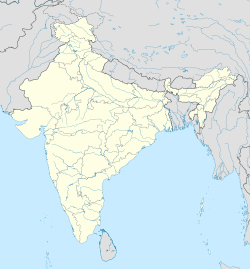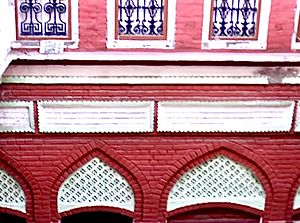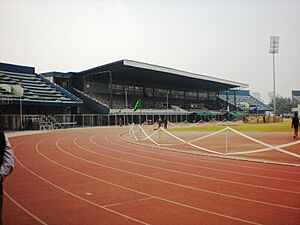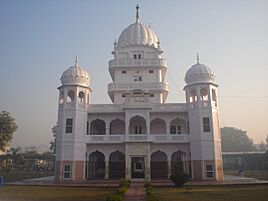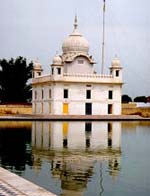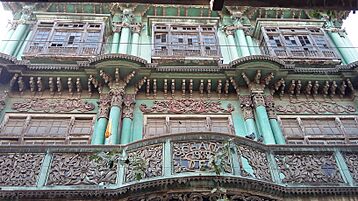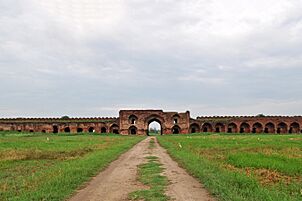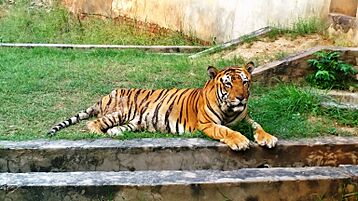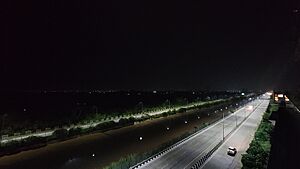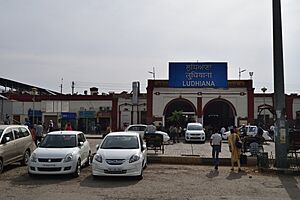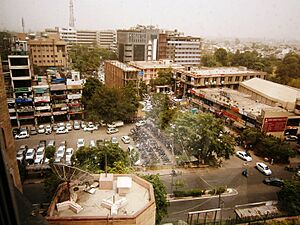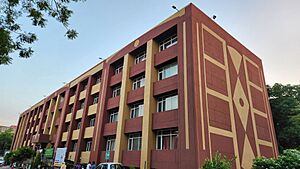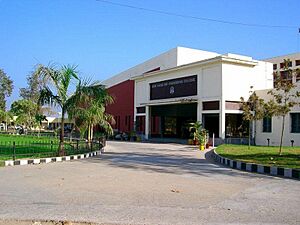Ludhiana facts for kids
Quick facts for kids
Ludhiana
|
|
|---|---|
|
From top, left to right: Gurudwara Dukhniwaran Sahib, Shri Durga Mata Mandir, Ludhiana Skyline, PAU Stadium, Guru Nanak Stadium
|
|
| Country | |
| State | Punjab |
| District | Ludhiana |
| Tehsil | Ludhiana West Ludhiana East |
| Founded by | Lodi dynasty |
| Named for | Lodi (Pashtun tribe) |
| Government | |
| • Type | Mayor–Council |
| • Body | Ludhiana Municipal Corporation |
| Area | |
| • Total | 310 km2 (120 sq mi) |
| Area rank | 1st in Punjab |
| Elevation | 247 m (810 ft) |
| Population
(2011)
|
|
| • Total | 1,618,879 |
| • Rank | 22nd in India, 1st in Punjab |
| • Density | 5,220/km2 (13,530/sq mi) |
| Demonym(s) | Ludhianvi |
| Time zone | UTC+5:30 (IST) |
| PIN |
Multiple 141001-141016
|
| Telephone code | 0161 |
| Vehicle registration | PB-10, PB-91 |
| HDI (2018) | |
Ludhiana is the biggest city in the Indian state of Punjab, with the most people living there. In 2011, about 1.6 million people lived here, spread over 310 square kilometers. This makes Ludhiana the most crowded city in Punjab. It is a major industrial hub in Northern India, often called "India's Manchester" because of its factories. It's also known as the business capital of Punjab.
The city is located near the old bank of the Sutlej River. The Indian government has named Ludhiana one of the top 100 "smart cities." The World Bank also says it's one of the easiest cities in India to do business in.
Contents
History of Ludhiana
During the time of the Tughlaq dynasty in India, a fort was built where Ludhiana is today. Later, in 1480, the Lodhi dynasty founded the city. The ruler, Sikandar Lodhi, sent two chiefs to take control of the area. One of them, Nihad Khan, started Ludhiana at a village called Mir Hota.
The name "Ludhiana" originally came from "Lodhi-ana," which means "Lodhi town." The Lodhi Fort, also called "Purana Qila," is the only old building left from that time. It was kept in good condition by later rulers but then fell apart. In 2013, it was declared a protected monument.
Ludhiana's Old City has famous spots like the Lodhi Fort, Daresi Grounds, The Clock Tower, and the Sood Family Haveli.
Geography and Climate
Ludhiana is located at about 244 meters (800 feet) above sea level. The city has an Old City and a New City. The New City, called Civil Lines, used to be where British officials lived during colonial times.
The land slopes down towards the north and west, where the Sutlej River used to flow before 1785. The Old Fort was right on the riverbanks.
The most common natural tree used to be the kikar, but now eucalyptus trees are more common. The British planted beautiful flowering trees like Gulmohars and jacarandas along the roads in Civil Lines. The Old City has very few trees or parks, except for some pipal trees, which are considered holy.
Weather in Ludhiana
Ludhiana has a humid subtropical climate with three main seasons: summer, monsoon (rainy season), and winter. On average, the city gets about 809 millimeters (31 inches) of rain each year.
Ludhiana has faced air pollution issues since 2011. The air quality has been much worse than what the World Health Organization suggests is safe. Water pollution is also a problem in some parts of the city.
| Month | Jan | Feb | Mar | Apr | May | Jun | Jul | Aug | Sep | Oct | Nov | Dec | Year |
|---|---|---|---|---|---|---|---|---|---|---|---|---|---|
| Record high °C (°F) | 29.2 (84.6) |
33.3 (91.9) |
41.1 (106.0) |
46.1 (115.0) |
48.3 (118.9) |
47.9 (118.2) |
47.8 (118.0) |
44.4 (111.9) |
41.7 (107.1) |
40.0 (104.0) |
35.8 (96.4) |
29.4 (84.9) |
48.3 (118.9) |
| Mean daily maximum °C (°F) | 17.9 (64.2) |
21.8 (71.2) |
27.3 (81.1) |
34.8 (94.6) |
39.0 (102.2) |
38.0 (100.4) |
34.1 (93.4) |
33.4 (92.1) |
33.1 (91.6) |
31.9 (89.4) |
27.1 (80.8) |
20.9 (69.6) |
29.9 (85.8) |
| Mean daily minimum °C (°F) | 6.1 (43.0) |
8.7 (47.7) |
13.0 (55.4) |
18.2 (64.8) |
23.5 (74.3) |
26.1 (79.0) |
26.6 (79.9) |
25.9 (78.6) |
23.5 (74.3) |
17.3 (63.1) |
11.2 (52.2) |
6.8 (44.2) |
17.2 (63.0) |
| Record low °C (°F) | −2.2 (28.0) |
−1.1 (30.0) |
1.4 (34.5) |
7.1 (44.8) |
11.7 (53.1) |
18.0 (64.4) |
17.4 (63.3) |
18.0 (64.4) |
15.2 (59.4) |
8.4 (47.1) |
0.3 (32.5) |
−1.1 (30.0) |
−2.2 (28.0) |
| Average rainfall mm (inches) | 28.0 (1.10) |
36.2 (1.43) |
27.0 (1.06) |
17.5 (0.69) |
21.2 (0.83) |
87.4 (3.44) |
217.1 (8.55) |
187.2 (7.37) |
138.4 (5.45) |
18.8 (0.74) |
3.9 (0.15) |
8.6 (0.34) |
791.1 (31.15) |
| Average rainy days | 2.1 | 2.9 | 2.1 | 1.7 | 1.7 | 4.9 | 8.6 | 8.7 | 5.5 | 1.0 | 0.4 | 0.9 | 40.6 |
| Average relative humidity (%) (at 17:30 IST) | 66 | 58 | 48 | 27 | 26 | 42 | 67 | 73 | 65 | 50 | 50 | 62 | 53 |
| Average dew point °C (°F) | 8 (46) |
12 (54) |
15 (59) |
16 (61) |
19 (66) |
23 (73) |
26 (79) |
26 (79) |
24 (75) |
19 (66) |
13 (55) |
10 (50) |
18 (64) |
| Average ultraviolet index | 4 | 5 | 7 | 8 | 9 | 9 | 8 | 7 | 7 | 6 | 5 | 4 | 7 |
| Source 1: India Meteorological Department Time and Date (dewpoints, 2005-2015) | |||||||||||||
| Source 2: Weather Atlas | |||||||||||||
| Climate data for Ludhiana (Punjab Agricultural University) 1981–2010 normals, extremes 1966–2011 | |||||||||||||
|---|---|---|---|---|---|---|---|---|---|---|---|---|---|
| Month | Jan | Feb | Mar | Apr | May | Jun | Jul | Aug | Sep | Oct | Nov | Dec | Year |
| Record high °C (°F) | 29.2 (84.6) |
30.0 (86.0) |
37.0 (98.6) |
44.0 (111.2) |
46.6 (115.9) |
46.0 (114.8) |
43.6 (110.5) |
40.0 (104.0) |
38.2 (100.8) |
37.6 (99.7) |
35.4 (95.7) |
27.2 (81.0) |
46.6 (115.9) |
| Mean daily maximum °C (°F) | 18.1 (64.6) |
21.1 (70.0) |
26.6 (79.9) |
34.5 (94.1) |
38.4 (101.1) |
38.2 (100.8) |
34.4 (93.9) |
33.5 (92.3) |
33.5 (92.3) |
31.9 (89.4) |
26.8 (80.2) |
21.0 (69.8) |
29.8 (85.6) |
| Mean daily minimum °C (°F) | 5.7 (42.3) |
7.8 (46.0) |
12.4 (54.3) |
17.4 (63.3) |
22.8 (73.0) |
25.9 (78.6) |
26.3 (79.3) |
25.8 (78.4) |
23.2 (73.8) |
16.7 (62.1) |
10.9 (51.6) |
6.7 (44.1) |
16.8 (62.2) |
| Record low °C (°F) | −1.6 (29.1) |
0.0 (32.0) |
2.1 (35.8) |
9.0 (48.2) |
12.0 (53.6) |
18.0 (64.4) |
20.5 (68.9) |
20.6 (69.1) |
14.5 (58.1) |
8.4 (47.1) |
4.3 (39.7) |
0.2 (32.4) |
−1.6 (29.1) |
| Average rainfall mm (inches) | 28.0 (1.10) |
30.4 (1.20) |
24.2 (0.95) |
21.9 (0.86) |
26.5 (1.04) |
68.6 (2.70) |
221.4 (8.72) |
195.3 (7.69) |
101.6 (4.00) |
12.9 (0.51) |
6.9 (0.27) |
14.1 (0.56) |
751.7 (29.59) |
| Average rainy days | 2.3 | 2.6 | 2.3 | 2.3 | 2.3 | 4.2 | 8.4 | 8.0 | 4.3 | 0.9 | 0.5 | 1.1 | 39.0 |
| Average relative humidity (%) (at 17:30 IST) | 67 | 62 | 52 | 30 | 28 | 42 | 66 | 72 | 63 | 49 | 51 | 62 | 54 |
| Source: India Meteorological Department | |||||||||||||
Ludhiana was ranked 31st among the "National Clean Air Cities" in India for cities with over 10 lakh (1 million) people.
People and Languages
In 2011, Ludhiana had a population of about 1.6 million people. Most people in the city can read and write, with a literacy rate of 86.50 percent.
Religions in Ludhiana
| Religion in Ludhiana City (2011) | ||||
|---|---|---|---|---|
| Religion | Percent | |||
| Hinduism | 65.96% | |||
| Sikhism | 28.75% | |||
| Islam | 2.81% | |||
| Jainism | 1.05% | |||
| Christianity | 0.68% | |||
| Other or not stated | 0.75% | |||
The main religion in Ludhiana is Hinduism, followed by about 66% of the people. Sikhism is the second largest religion, with about 29% of the population. Islam is followed by 2.8%, and Christianity by less than 1%.
Languages Spoken
In 2011, most people in Ludhiana (67%) spoke Punjabi as their first language. About 29% spoke Hindi, and 1.35% spoke Bhojpuri.
City Management
The Ludhiana Municipal Corporation is the local government body that manages the city's services and development.
Economy and Industry
The World Bank has ranked Ludhiana as one of the best cities in India for doing business. This is largely thanks to its many small factories. These factories make industrial goods, machine parts, car parts, home appliances, hosiery (like socks and tights), clothes, and garments.
Ludhiana is the biggest center in Asia for making bicycles. It produces more than half of all bicycles made in India each year. The city also makes 60% of India's tractor parts and many parts for cars and two-wheelers. Some parts used in famous German cars like Mercedes and BMW are made only in Ludhiana for the whole world. It is also a major producer of domestic sewing machines, hand tools, and industrial equipment. Ludhiana contributes a lot to Punjab's economy.
The clothing industry in Ludhiana is very important, especially for winter clothes. It's known for its woolen sweaters and cotton T-shirts. Many big Indian woolen clothing brands are based here. Ludhiana is also famous for making shawls and stoles for major brands. Because of its strong textile industry, it's often called the "Manchester of India." Ludhiana also has a growing IT (Information Technology) sector with companies that create software.
Fun Things to Do
Sports Activities
The Guru Nanak Stadium in Ludhiana is a popular place for many sports events. These include athletics, football, badminton, basketball, gymnastics, handball, kabaddi, table tennis, and volleyball.
Kabaddi Matches
The Kabaddi World Cup finals have been held twice at Guru Nanak Stadium. The stadium often hosts big Kabaddi games.
Football Games
Important football competitions, like the finals of the National Games Football Matches (in 2001) and I-League matches, have been played at Guru Nanak Stadium.
Kila Raipur Sports Festival
The Kila Raipur Sports Festival, also known as the Rural Olympics Games, happens every year near Ludhiana. It features traditional rural sports like gatka (a Sikh martial art), bullock cart races, trolley races, kabaddi, and acrobatics.
Skating Rink
There's a skating rink located in Leisure Valley, Sarabha Nagar, where you can enjoy skating.
Interesting Places to Visit
- Alamgir
- Doraha
- Jagraon
- Katana Sahib
- Khanna
- Kila Raipur
- Machhiwara
- Mullanpur Dakha
- Nanaksar
- Payal
- Serai Lashkari Khan
- Sidhwanbet
- Rose Garden
- Rakh Bagh
- Sudhar
- Sri Bhaini Sahib
- Guru Ji Aashram, Dugri
Getting Around Ludhiana
Ludhiana has good connections by road and rail. The Ludhiana railway station is on the main route between Delhi and Amritsar. It's an important railway hub with lines going to many other cities across India.
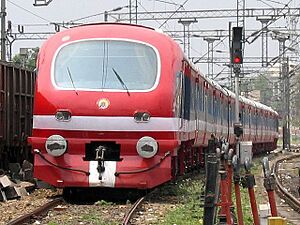
Road Travel
Ludhiana is connected to other cities in Punjab and other states by bus. Major national highways like NH 44 and NH 5 pass through the city. You can travel by buses run by the state-owned Punjab Roadways or by private companies.
Airports Near Ludhiana
Ludhiana has its own airport, Sahnewal Airport, also known as Ludhiana Airport. It's about 5 kilometers (3 miles) southeast of the city. A new, larger airport is being built at Halwara Air Force Station.
The closest International Airport to Ludhiana is Chandigarh Airport. Other nearby airports include Adampur Airport in Jalandhar and Sri Guru Ram Dass Jee International Airport in Amritsar.
Train Travel
The Ludhiana Junction railway station connects the city to other major cities. There are also smaller railway stations like Sahnewal, Doraha, and Qila Raipur that handle cargo and passenger trains. The Vande Bharat Express train also stops at Ludhiana Junction.
City Transportation
Inside the city, people mostly travel by auto-rickshaws and cycle rickshaws. Taxi services like Ola Cabs and Uber are also very popular. You can also rent cars for self-drive from services like Zoomcar.
Auto Rickshaws
Auto-rickshaws are three-wheeled vehicles that can carry a few passengers. You can hire them just for yourself or share them with others. They are easy to find and are a common way to travel in the city.
Cycle Rickshaws
Cycle rickshaws are also widely used in Ludhiana. These are tricycles pulled by a person and are a relatively cheap way to get around.
Education in Ludhiana
Schools in the City
Ludhiana has many schools, including 363 senior secondary schools, 367 high schools, and many primary schools. In total, over 398,000 students attend schools here. Most schools follow the curriculum of the Central Board of Secondary Education or the Punjab School Education Board.
Agricultural University
Ludhiana is home to the Punjab Agricultural University, which is one of the largest agricultural universities in Asia and the world. The College of Veterinary Sciences at this university was recently upgraded to the Guru Angad Dev Veterinary and Animal Sciences University (GADVASU). GADVASU focuses on animal health and livestock production through teaching and research.
Medical Education
Christian Medical College, Ludhiana was the first medical school for women in Asia, founded in 1894. It is a well-known hospital in India. Dayanand Medical College and Hospital is another important teaching hospital in Ludhiana. Both these institutions are recognized by the Medical Council of India.
Engineering Colleges
Guru Nanak Dev Engineering College offers education for engineering students. It also has a special center for research and development in bicycles and sewing machines.
Ludhiana College of Engineering and Technology is another institute for engineering and management studies.
See also
 In Spanish: Ludhiāna para niños
In Spanish: Ludhiāna para niños
 | Sharif Bey |
 | Hale Woodruff |
 | Richmond Barthé |
 | Purvis Young |


